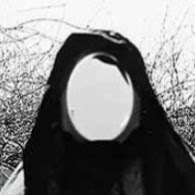"The scientific world view of the Enlightenment...supplies a norm of nature that affords the conceptual space necessary for the supernatural, even if it also regards that space as one of superstition." Carroll, The Philosophy of Horror, 57.
"Much of the power of Western horror-lore was undoubtedly due to the hidden but often suspected presence of a hideous cult of nocturnal worshippers whose strange customs--descended from pre-Aryan and pre-agricultural times...were rooted in the most revolting fertility-rites of immemorial antiquity." Lovecraft, Supernatural Horror in Literature, 18.
"The boundaries of the realm of chaos have been pushed back since the dawn of physical science...but the slightest reflection will show that our explanations do not explain and that behind the laws we quote so glibly is couched a vaster mystery than humanity dare confront." Fearnley, "Notes on the Psychology of Horror," The Sewanee Review (Aug. 1895), 423.

Junji Ito, "Assassins", Museum of Terror 2.
"Horror literature represents a ritualized encounter with that which strikes us as most terrible." Morgan, The Biology of Horror, 36. (my emphasis)
"Horror literature broaches the question of what in fact we are to make of the organic, how we are to reconcile the inner and outer biological, to negotiate the evident continuity." ibid., 100.
"The problems of material continuity are also linked to spatial and topological problems concerning the material process by which the formless body of decay and putrefaction is re-assembled and re-vitalized."..."Horror expresses the logic of incommensurability between Life and the living." Thacker, "Nine Disputations on Theology and Horror," Collapse IV, 69; 76.

